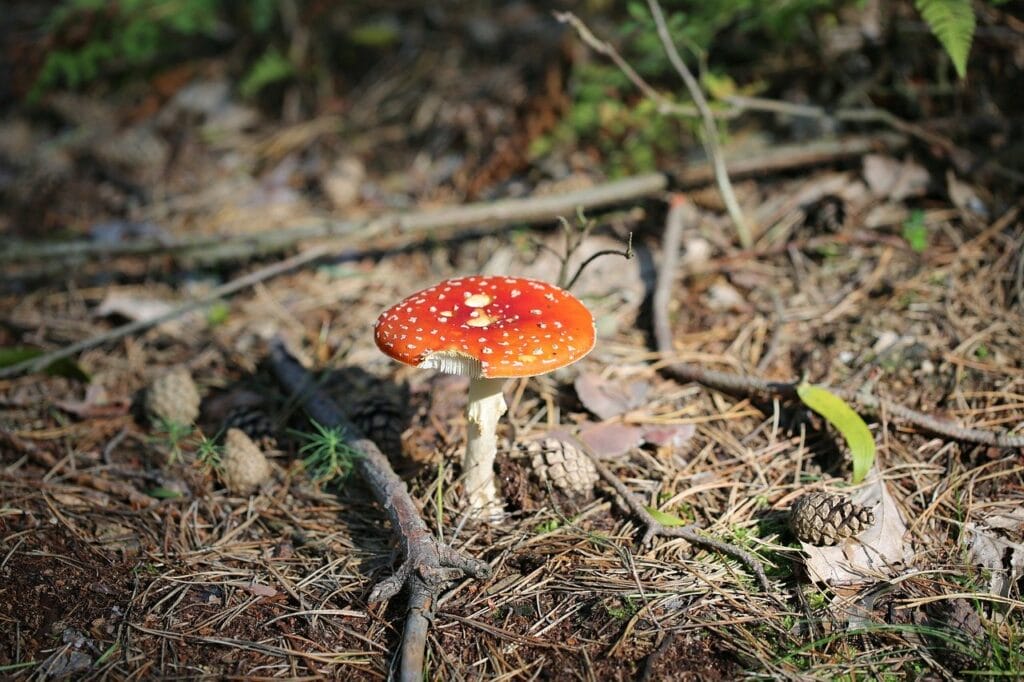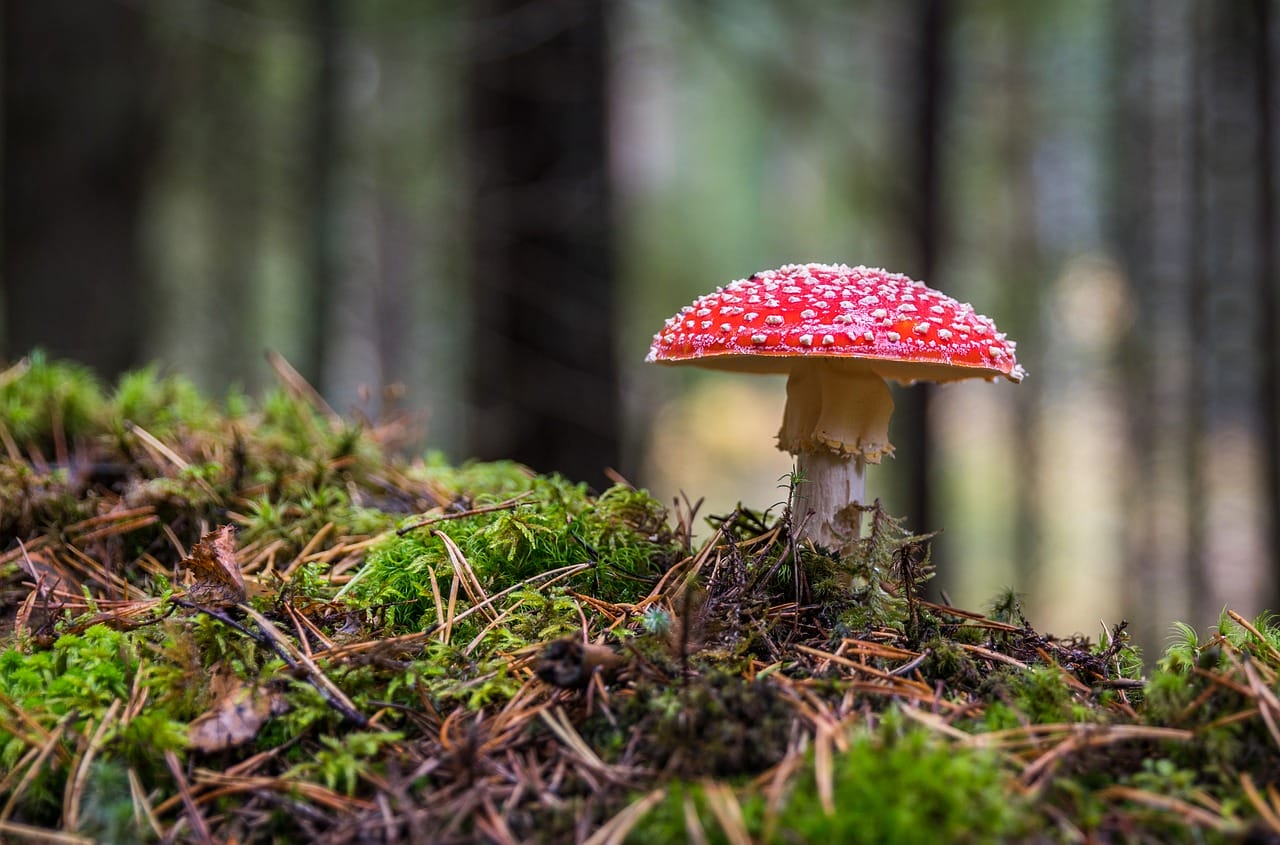Throughout the course of human history, people have acknowledged and intentionally utilized the hallucinogenic characteristics of certain plants and fungi.
Among these, fungi, especially magic mushrooms, are identified as the primary natural provider of hallucinogenic substances.
The hallucinogenic element psilocybin, obtained from mushrooms, holds a notable position in history, as it has been employed in sacred rituals and therapeutic practices.
A number of researchers are dedicating their energy to explore the potential health benefits of shrooms online. The existing research has shed light on the impacts of psilocybin mushrooms. These insights provide hope for many people, highlighting the need for a dialogue on the significance of integrating them into the healthcare system of Canada.
Main Takeaways:
- Magic mushrooms carry the mind-altering compound psilocybin, which offers various benefits to address mental health concerns in Canada.
- In comparison to opioids, psilocybin is safer and presents a lower risk of addiction and toxicity.
- Psilocybin demonstrates long-term effectiveness in treating depression, with effects that can persist for up to a year.

Grasping Psilocybin
Psilocybin is an indole-alkylamine (tryptamine) extracted from magic mushrooms and bears structural resemblances to lysergic acid diethylamide (LSD). Its effects encompass hallucinatory and euphoric sensations, likely due to its interaction with serotonin (5-HT) receptors in the central nervous system.
Given its engagement with serotonin receptors, high-quality magic mushrooms exhibit a unique tendency to aid in handling mental health disorders.
Canada’s Mental Health and Opioid Dilemma
Common Mental Health Disorders in Canada & Resistance to Treatment
| 2012 | 2022 | |
| Major Depressive Episodes | 4.7% | 7.6% |
| Generalized anxiety disorder | 2.6% | 5.2% |
| Social phobia | 3.0% | 7.1% |
| Alcohol use disorder | 3.2% | 2.2% |
Nearly 37% of individuals dealing with mood, anxiety, or substance abuse disorders have expressed their healthcare and mental health needs are not being met or are insufficiently addressed.
A study published in the Canadian Journal of Psychiatry offers a look into the attitudes of depression patients towards seeking treatment. This research studied 1282 patient records from 135 doctors, identifying 263 patients with treatment-resistant depression (TRD). The prevalence rate of TRD in Canada was found to be 21.7%.
The Opioid Crisis
An estimated 8 million Canadians, or one in every five, struggle with chronic pain. If not properly managed, this pain can negatively affect various aspects of a person’s life.
Healthcare professionals often recommend opioid medications for managing pain. While opioids can provide benefits such as relief from pain and improved function, they also come with potential risks.
Between January 2016 and March 2022, there were at least 30,843 deaths in Canada related to opioid toxicity. The majority of these tragic events occurred in early 2021, with a staggering 5,368 cases reported. Notably, over 88% of these cases were in the provinces of British Columbia, Ontario, and Alberta.
Regarding Major Depressive Episodes
In a research study featured in the Journal of Psychopharmacology, 27 individuals with a longstanding history of depression were enrolled. The majority of these individuals had been dealing with depressive symptoms for approximately two years prior to the study. It was found that 88% of these individuals had been treated with traditional antidepressants in the past, and 58% reported ongoing use of these medications during their depressive episodes.
The study found significant reductions in depression following psilocybin treatment for both groups. The severity of depression was also noted to remain consistently low at one, three, six, and 12 months after treatment.
Regarding General Anxiety and Social Phobia
A case study published in the Croatian Medical Journal in October 2021 explored HTML:
The narrative revolves around a A 16-year-old boy, seeking help at a mental health clinic, found himself burdened by social isolation, debilitating anxiety, and deteriorating academic performance. His issues were compounded by a learning disability and a lack of motivation to do schoolwork, which made group therapy sessions overwhelming and unproductive for him.
However, notable improvements were seen after three psilocybin sessions spread over a period of 18 months. His anxiety was notably alleviated, and his communication skills with peers and teachers significantly improved. He started to express his emotions more freely, became an active participant in group therapy, and experienced improved interpersonal relationships.
Treating Alcohol Use Disorder
A recent clinical trial, detailed in a study published in JAMA Psychiatry on August 24, revealed the potential of combining psilocybin with psychotherapy to effectively treat alcohol use disorder. The researchers tracked the progress of 93 patients diagnosed with the disorder over a period of 32 weeks.
Out of the 48 patients who underwent psilocybin-assisted therapy, a remarkable 83% decrease in alcohol consumption was observed within eight months of their initial dose, compared to a 51% reduction in the placebo group. Almost half of the patients who received psilocybin therapy stopped drinking entirely.
Addressing the Opioid Crisis
Elena Argento, a postdoctoral researcher at the University of British Columbia and BC Centre on Substance Use, is investigating the medicinal applications of psychedelics.
Argento explains that psilocybin can help reduce addiction risks by impacting both neurobiology and psychology. She asserts that the transformative experiences psychedelics can evoke, often characterized by a profound sense of awe and self-transcendence, can aid individuals in discovering fresh interpretations and objectives in life. This can potentially catalyze behavior modifications, especially concerning addiction.
In a recent longitudinal study led by Argento and the BC Centre on Substance Use, the research showed a significant decrease in the likelihood of continued daily illicit opioid use among those who had recently used psychedelics or had done so in the past six months.
Argento’s 2018 study further indicated that psychedelic use could act as a protective factor against the relationship between prescription opioid use and suicide risk.
Another study found associations between psilocybin use and a reduced risk of opioid use disorder. This earlier research suggested a 40% decrease in the risk of opioid misuse and a 27% reduction in the risk of opioid dependence. from psychedelic use over the past year.
Psilocybin Needs to be Considered as Part of Canada’s Therapeutic Strategy by Health Canada and Other Regulatory Bodies
Despite Psilocybin’s recognized potential to positively influence the mental health of Canadians, it remains challenging to obtain. While Health Canada allows healthcare professionals to prescribe this treatment through the Special Access Program, the stringent regulations of the program create significant barriers for many professionals and patients.
The medicinal use of psilocybin-containing mushrooms could revolutionize mental health care in Canada, offering potentially transformative benefits. Rather than relying on conventional, but often less effective, treatments like pharmaceuticals or opioid replacement therapy, psilocybin therapy presents a potential alternative with potential for deep and long-lasting effects.
There’s evidence indicating that psilocybin therapy could have sustained benefits, potentially saving patients substantial costs on ineffective treatments. Additionally, research indicates that psilocybin is relatively safe, with minimal toxicity, a low risk of misuse, and infrequent instances of overdose.
Where Can One Buy Psilocybin Online?
For Canadians who find it hard to access psilocybin therapy, they can purchase magic mushrooms online to help manage their circumstances. A variety of magic mushroom products are available, from high-dose shrooms to microdosed magic mushrooms.
High-dose shrooms are psychedelic mushrooms available in different forms, such as dried magic mushrooms, edibles, or beverages, which are consumed for their hallucinogenic and therapeutic effects.
Magic mushrooms for microdosing are products containing small amounts of magic mushrooms. Offered in capsules, shroom edibles, or shroom tea, purchasing shrooms online provides an alternative way to subtly experience these mushrooms’ benefits. Funguyz Canada exclusively provides high-quality magic mushrooms online.
Is Psilocybin a Good Fit for the Canadian Healthcare System?
Psilocybin is often misunderstood due to its recreational use. It’s important to note that compared to opioids and other drugs commonly prescribed in healthcare, psilocybin has a safer profile.
Increasing evidence suggests its potential benefits, similar to those of marijuana, in treating various mental health conditions and exploring the dimensions of reality.
From a holistic health standpoint, magic mushrooms have long been utilized to bolster mental health therapies and foster individual development.
What might be the potential risks and side effects of using magic mushrooms?
Magic mushrooms can produce a range of effects, both beneficial and harmful. These may encompass hallucinations, altered sensory experiences, and psychological shifts. However, they can also lead to unpleasant symptoms such as nausea, vertigo, and in rare instances, psychological discomfort. It is critical to treat the use of magic mushrooms with discretion and reverence, being aware of the potential risks. It is always prudent to consult with a healthcare provider before initiating any new regimen involving magic mushrooms.
Is purchasing magic mushrooms online a safe practice?
Acquiring magic mushrooms online can be a safe practice, as long as you select a trustworthy supplier. It is vital to perform comprehensive research about the product, its brand, and the online vendor before committing to a purchase. Customer testimonials and ratings are valuable tools for assessing the product’s quality and the trustworthiness of the provider. Always opt for vendors who prioritize customer safety, satisfaction, and provide secure options for payment.
Is it feasible to cultivate my own magic mushrooms?
Indeed, it is feasible to cultivate magic mushrooms at home, an endeavor that can prove to be quite rewarding. However, it necessitates specific environmental conditions and a comprehensive understanding of the cultivation procedure. Numerous kits and guides are available online to support you in your mushroom farming venture. However, bear in mind that the legality of cultivating magic mushrooms is subject to local laws and regulations, so it is essential to ensure you are compliant.
experiences. In the realm of holistic wellness, some people opt for a more moderate approach, consuming small amounts of mushrooms to garner their benefits without triggering hallucinations.Articles You Might Find Interesting:





